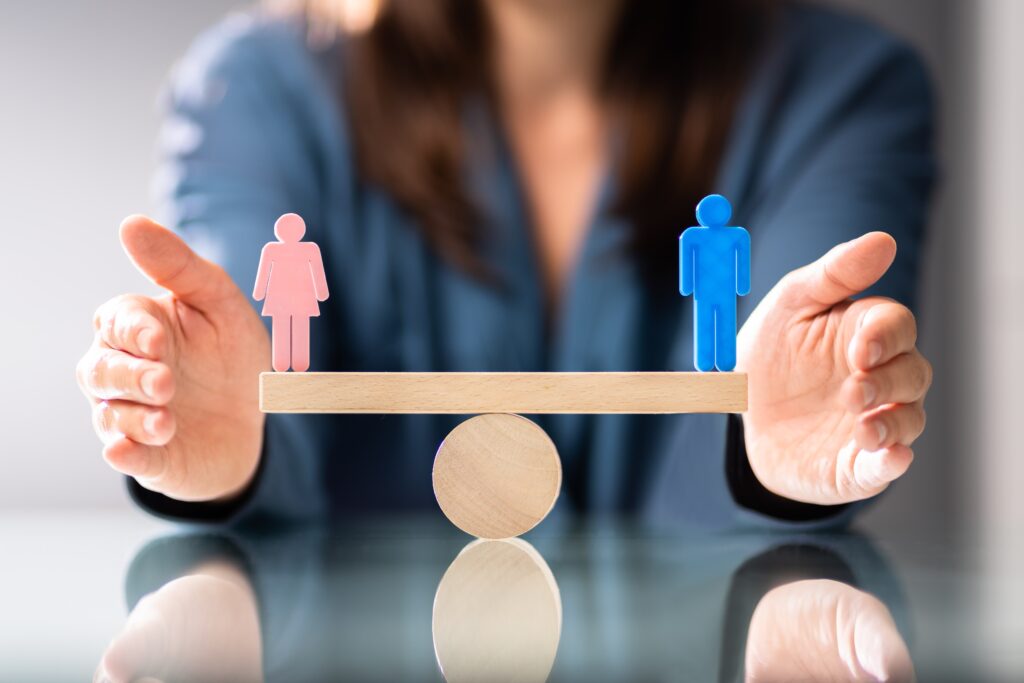
The topic of "equal rights for men and women" is omnipresent. There is constant discussion in the media about the areas in which there is still a lack of progress and what opportunities there are for improvement. But why are women still disadvantaged even in times of supposedly complete emancipation? The following article aims to get to the bottom of the causes.
According to the Gender Equality Index of the European Institute for Gender Equality, there is not yet complete equality between the sexes in the EU. In this respect, Germany will achieve a Index value of 67.4 points, which is slightly above average in a country comparison.
Before we discuss the possible causes, it is first necessary to clarify what equality between men and women means in concrete terms. According to the definition of the aforementioned European Institute for Gender Equality, equality means that men and women - as well as boys and girls - have the same rights, duties and opportunities.
This applies in legal, professional and personal terms. In this context, the term equality, which also appears in the Basic Law is anchored.
According to the Basic Law, therefore, there should be no gender discrimination at all in our country. The fact that this is not the case in practice is proven by countless examples from the media and business. Perhaps you, as a woman, have also experienced contempt or even sexism?
As part of a study by Ipsos in cooperation with the Global Institute for Women's Leadership and International Women's Day, 18,000 people in 27 countries were asked in which areas they felt equality was still lacking. In Germany, the following points were mentioned most frequently:
All the problems mentioned have their origin in not too distant Past. Less than a hundred years ago, even in this country, it was taken for granted that the man earned the money and the woman took care of the household and the children. It was only after the end of the Second World War that a change in thinking slowly took place. This process continues to this day.
In historical terms, therefore, modern role models have not been around all that long. The question of why women and men are not fully equal could, at its core, be related to the centuries-long preference for men. Some cultures have still internalized this role model.
Although the new family structures that allow fathers to devote themselves to raising children and women to pursue careers have been increasingly implemented in recent years, it is mostly mothers who accept professional restrictions in favor of raising children. For this reason, it is not surprising that there are still (too) few women in management positions.

We have already briefly touched on the biggest obstacle to gender equality: In this country, the still suboptimal compatibility of career and family plays a central role. Many women are still faced with the choice of whether they would rather have children or pursue a career. For men, this question does not usually arise.
It is true that there is the option of taking parental leave or returning to work only part-time, even as a father. In fact, the Odds increased over the last ten years, albeit at a very low level.
It is still predominantly women who work part-time or in mini-jobs. In Europe, the average net income of women is only 62 percent of the average net income of men. In addition, men are often given preferential treatment and more intensive promotion by their superiors, who are often also male, increasing the likelihood of career advancement.
In addition, the term feminism has a rather negative stigma attached to it, which is why some women simply do not dare to demand their rights more clearly. According to surveys, only three out of ten German women would describe themselves as feminists. Among the male population, less than one in five can identify with the term.
Have you ever asked yourself what the topic of "equal rights for men and women" means to you personally? What image have you as a woman / man internalized of the respective gender? Do you behave in a way that corresponds to your own convictions or are there discrepancies?
Your own parents play a significant role in how you view gender roles. If they have given you an image of equality, you will take equality for granted as an adult and not be afraid to stand up for your rights as a woman.
However, if your father was very dominant and your mother rather submissive, it is quite possible that this role model has negatively influenced you. This is often reflected in your career and partnership. Social expectations on the subject of equality may also put you under pressure. The latter applies equally to men and women.
Equality between men and women is an important issue in both professional and personal matters. As mentioned before, there are various social norms that can put you under pressure: After all, no man wants to be seen as misogynistic and no woman as unemancipated.
To find out what negative beliefs are influencing you in this regard, a professional Coaching be very helpful. Here your internal blockades illuminated and corrected with the help of suitable methods. How exactly the Coaching The way this can look is individually different and depends entirely on your personal subject matter.
The topic of "equal rights for men and women" is of elementary importance, especially in relationship issues. For harmony within the partnership, both partners should be able to formulate their wishes and expectations and have a appreciative Maintaining contact with each other. This is where relationship coaching can help. The coach will support you in finding your Improve communication.
Every person, regardless of gender, should have the same opportunities for Self-realization have. A large part of the population would probably agree with this statement. A society in which there is equality between women and men is not only more peaceful and livable, but also more economically successful.
The fact that the discrimination of women weakens economic power becomes clear in a global comparison: Although women make up half of the people of working age (around 50 %), they generate only 37 percent of global gross domestic product. If women in all countries had equal rights in terms of career and education, this would contribute to global prosperity.

Even if the goal has not yet been achieved, there has nevertheless been progress in the area of equal rights for men and women. Fortunately, equal opportunities and the prohibition of discrimination have long been enshrined in the Basic Law. In the following, we would like to give 5 examples from everyday life:
Equal rights for men and women: the progress
The topic of "equal rights for men and women" is often discussed. But what can we do to improve the situation of women in the long term? The following five factors are crucial:
This is primarily a matter for policymakers. But you yourself can also ensure that gender discrimination is reduced, at least in your immediate environment, by treating men and women equally in all areas. As a woman, stand up for your rights both professionally and privately. If you are a man in a management position, you can specifically promote female employees professionally.

